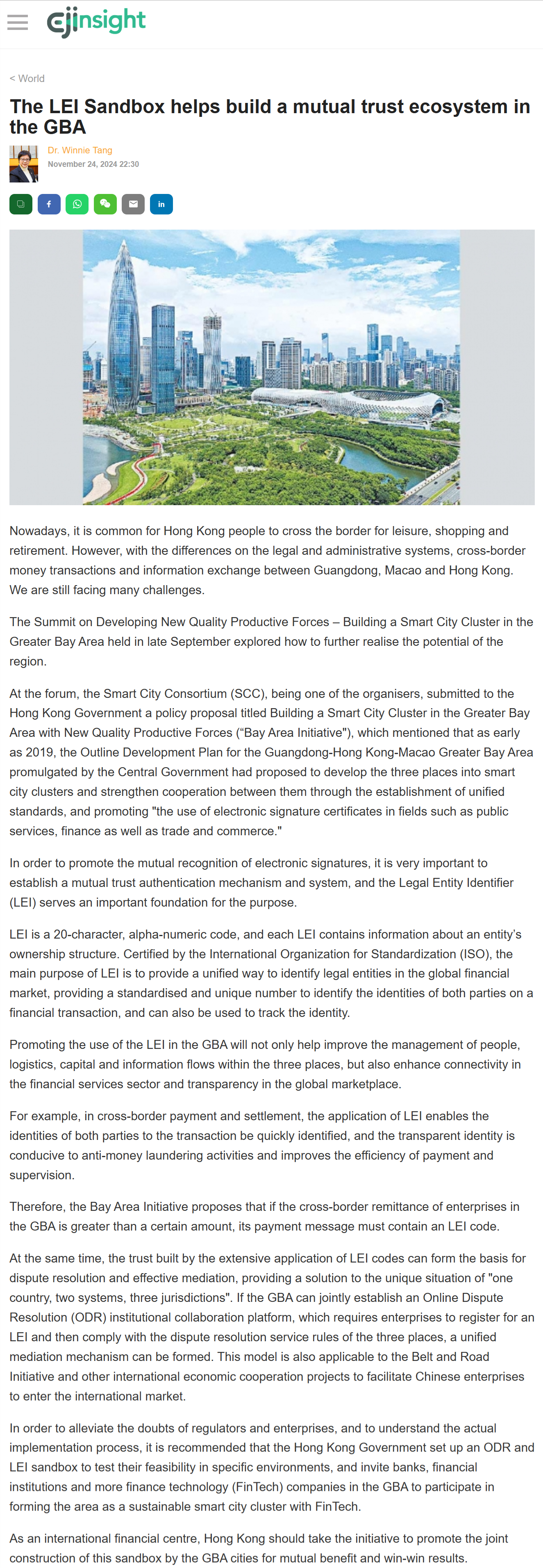網上版請按此

The LEI Sandbox helps build a mutual trust ecosystem in the GBA
Nowadays, it is common for Hong Kong people to cross the border for leisure, shopping and retirement. However, with the differences on the legal and administrative systems, cross-border money transactions and information exchange between Guangdong, Macao and Hong Kong. We are still facing many challenges.
The Summit on Developing New Quality Productive Forces – Building a Smart City Cluster in the Greater Bay Area held in late September explored how to further realise the potential of the region.
At the forum, the Smart City Consortium (SCC), being one of the organisers, submitted to the Hong Kong Government a policy proposal titled Building a Smart City Cluster in the Greater Bay Area with New Quality Productive Forces ("Bay Area Initiative"), which mentioned that as early as 2019, the Outline Development Plan for the Guangdong-Hong Kong-Macao Greater Bay Area promulgated by the Central Government had proposed to develop the three places into smart city clusters and strengthen cooperation between them through the establishment of unified standards, and promoting "the use of electronic signature certificates in fields such as public services, finance as well as trade and commerce."
In order to promote the mutual recognition of electronic signatures, it is very important to establish a mutual trust authentication mechanism and system, and the Legal Entity Identifier (LEI) serves an important foundation for the purpose.
LEI is a 20-character, alpha-numeric code, and each LEI contains information about an entity's ownership structure. Certified by the International Organization for Standardization (ISO), the main purpose of LEI is to provide a unified way to identify legal entities in the global financial market, providing a standardised and unique number to identify the identities of both parties on a financial transaction, and can also be used to track the identity.
Promoting the use of the LEI in the GBA will not only help improve the management of people, logistics, capital and information flows within the three places, but also enhance connectivity in the financial services sector and transparency in the global marketplace.
For example, in cross-border payment and settlement, the application of LEI enables the identities of both parties to the transaction be quickly identified, and the transparent identity is conducive to anti-money laundering activities and improves the efficiency of payment and supervision.
Therefore, the Bay Area Initiative proposes that if the cross-border remittance of enterprises in the GBA is greater than a certain amount, its payment message must contain an LEI code.
At the same time, the trust built by the extensive application of LEI codes can form the basis for dispute resolution and effective mediation, providing a solution to the unique situation of "one country, two systems, three jurisdictions". If the GBA can jointly establish an Online Dispute Resolution (ODR) institutional collaboration platform, which requires enterprises to register for an LEI and then comply with the dispute resolution service rules of the three places, a unified mediation mechanism can be formed. This model is also applicable to the Belt and Road Initiative and other international economic cooperation projects to facilitate Chinese enterprises to enter the international market.
In order to alleviate the doubts of regulators and enterprises, and to understand the actual implementation process, it is recommended that the Hong Kong Government set up an ODR and LEI sandbox to test their feasibility in specific environments, and invite banks, financial institutions and more finance technology (FinTech) companies in the GBA to participate in forming the area as a sustainable smart city cluster with FinTech.
As an international financial centre, Hong Kong should take the initiative to promote the joint construction of this sandbox by the GBA cities for mutual benefit and win-win results.
Dr Winnie Tang
Adjunct Professor, School of Computing and Data Science; Department of Geography, Faculty of Social Sciences, The University of Hong Kong